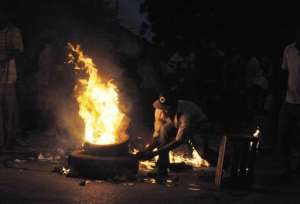
DAKAR (AFP) - Senegalese riot police fired tear gas to break up a tense, thousands-strong rally Tuesday in Dakar demanding that President Abdoulaye Wade drop plans to seek a third term in office.
Opposition groups united under the June 23 Movement (M23), had called for mass resistance after a decision last Friday by the country's top judges allowing Wade to seek a third mandate in the February 26 polls.
Thousands had gathered by late afternoon in a square in the working class suburb of Colobane, where tension rose and angry youths hurled rocks at scores of riot police keeping watch from afar.
Iconic singer Youssou Ndour, whose presidential hopes were dashed when the constitutional council rejected his candidacy, took to the stage and gestured encouragingly when the crowd chanted: "Let's march to the palace," referring to the presidency downtown.
The agitated protestors dispersed after police fired tear gas and sprayed water on them, but some youths burnt tyres and engaged in running battles with police in side streets after the square emptied out.
An AFP journalist saw a woman with injuries to her leg.
A ruling by the constitutional council that Wade was legally allowed to run has sparked fury among opponents who accuse him of fiddling with the law.
"We have decided to take on oppression, injustice, dictatorship," presidential candidate Moustapha Niasse told journalists, his eyes red from tear gas.
One of Africa's most stable nations, Senegal has been rocked by riots after the court ruling, prompting international calls for calm.
Amnesty International urged authorities "to refrain from using live bullets against peaceful protesters" after two people were shot dead and several others suffered gunshot wounds during a protest Monday in the northern city of Podor.
Salvatore Sagues, the global rights body's west Africa researcher, said Monday's bloodshed was a "dramatic escalation" of violence in the country normally seen as a beacon of democracy among often troubled neighbours.
Washington has urged Wade, who has been in office since 2000, to allow power to pass "to the next generation."
"While we respect the process ... our message to him remains the same: that the statesmanly-like thing to do would be to cede to the next generation," State Department spokeswoman Victoria Nuland told journalists.
But El Hadj Amadou Salla, minister of state and a senior Wade campaign official, said it was "too late" and that the president's candidacy has already been validated.
The opposition argues that the constitution allows a president to serve only two consecutive terms.
When Wade was voted into office in 2000 after 25 years in opposition and the defeated incumbent bowed out gracefully, Senegal was hailed as a model for the strife-torn continent.
However term lengths were amended in 2008 and Wade says the law does not apply retroactively, which theoretically allows him to serve two seven-year terms from 2012.
"I ask the majority to go out and protest, peacefully, to put an end to this coup d'etat," the Grammy-winning Ndour said.
He said the judges, who ruled that thousands of signatures handed in by Ndour were invalid, "are afraid of me."
He added: "I hold the majority in Senegal. I am the recourse."
Aside from Wade, the council approved 13 other candidates to run in the election including three former prime ministers and main opposition leader Ousmane Tanor Dieng.
Wade said in an interview with a local news website last Thursday that he needs three more years to complete his projects, fueling speculation that he wants to line up a successor.
He has long been accused of trying to position his 44-year-old son Karim Wade -- already a super-minister in his cabinet -- to fill his shoes.
A US diplomatic dispatch published by WikiLeaks in 2010 warned that Senegal was "a weakening democracy," saying Wade was looking to "open a path to a dynastic presidential succession."




 We’re disappointed over gov’t’s lacklustre attitude to negotiations of our condi...
We’re disappointed over gov’t’s lacklustre attitude to negotiations of our condi...
 No more Buffer Stock as Mahama promises to decentralise SHS food supply
No more Buffer Stock as Mahama promises to decentralise SHS food supply
 NSS urges President Akufo-Addo to sign National Service Bill into law
NSS urges President Akufo-Addo to sign National Service Bill into law
 You're lying, your 7-11pm dumsor attributed to overloaded transformers is false ...
You're lying, your 7-11pm dumsor attributed to overloaded transformers is false ...
 Consult Council of State on anti-gay bill – Mahama advises Akufo-Addo
Consult Council of State on anti-gay bill – Mahama advises Akufo-Addo
 Transport Ministry has no power to determine fares – COPEC
Transport Ministry has no power to determine fares – COPEC
 Brace yourselves for more economic hardship – Prof Adei to Ghanaians
Brace yourselves for more economic hardship – Prof Adei to Ghanaians
 Any government depending on IMF is likely to fail – Grand Coalition
Any government depending on IMF is likely to fail – Grand Coalition
 Ghana risks losing premium cocoa position due to galamsey – COCOBOD laments
Ghana risks losing premium cocoa position due to galamsey – COCOBOD laments
 Akufo-Addo launches NSS policy document to tackle under-utilisation of service p...
Akufo-Addo launches NSS policy document to tackle under-utilisation of service p...
